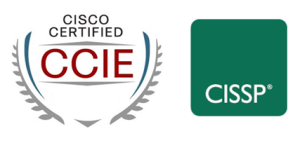Whether you have CCIE or CISSP certification not, the project experience is very important.
But to some extend one with CISSP will be more welcome to market than CCIE.
safety awareness can be seen in the interview. You can get the certificate to explain the problem, but now it is the status quo of the talent gap. It is not necessary to screen you. It is important for Party B to have a certificate. To your extent), for Party A, it may be "the same situation to choose the best admission." Network security engineer, "getting a CISSP" is not so easy. First of all, you are sure that you can understand it. Secondly, you have to pass the test. Then you have to get the certificate. Finally, you have to maintain the credits. These four things. There are gaps between the two (simple between 23).
CCIE
Cisco is very useful to suppliers, all kinds of integration with Cisco products, but Party A, redundancy must be two different manufacturers, what about CCIE, the service is to buy manufacturers. The extreme point is that a CCIE has been in the world for ten years, you can think of it as a role with the red hat qualification, is to use their own manufacturers (of course not so uncomfortable, CISCO is still the world's largest hardware supply Business, CCIE's research on security is also very deep, that is, it can only manage itself cannot control others, and CISSP can't help you.
CISSP
CISA If you have a practical use in Party A, it is to broaden your horizons. I don't believe that if a college graduate directly enters the company, it will be safe. However, if you are familiar with CISSP, even if you just master the nouns in it, you have not actually done it. It is much easier to communicate with you about security issues. And, you know where to find cases, reference standards, etc. 4, recruitment, job hopping, no certificate will be very difficult. You need to get a chance to get an interview. Regardless of which certificate, plan your time, go check one. Even if it is on paper, it is harder to talk about than the talk. (There are a lot of paper CCIEs, which are despised by some technologies. Believe me, they just don't have the chance to touch a lot of equipment. It's bad, it's also passing)

 Join Telegram Study Group ▷
Join Telegram Study Group ▷













